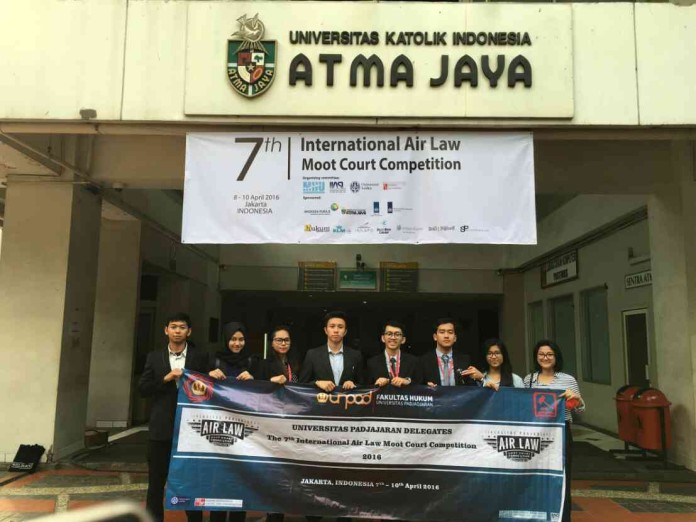As a college student, some of us try to apply what we learned in classes by entering competitions, often related to our major. For law students, the most commonly attended competitions are moot court competitions. In this article, Muhammad Irsan shares his experience of attending several international moot court competitions, and gives some tips for those who wish to join them.
Being a law student puts you in a situation where you will be involved in multiple activities. You must balance your academic and social life, which is why being involved in both organizational activities and competitions is essential for law students. One of the most famous competitions among law students is the moot court competition.
What is a moot court competition?
Moot court competition is a simulation of a court or an arbitration hearing. Arbitration perhaps is not quite as popular as the court; as the former is more confidential than the latter, and its purpose is to keep both parties’ dispute away from the media. Other differences are the term used for the judges. In arbitration, it is called the arbitrators. Unlike court judges that are selected by the institution for the parties, arbitrators are selected by both parties under mutual agreement.
Notwithstanding the differences stated above, both court and arbitration proceedings are generally the same. Moot court competition imitates the real proceeding. It begins with the judge or arbitrator entering the hearing room, the mooters bow to give respect to the judges, and the bailiff (the MC of the Court) announces the case. After that, the mooters give their appearances and present their submissions, a legal term for written arguments; to the judges while the judges are also given the opportunity to ask questions to the mooters. Finally, the judges will deliberate and deliver a brief judgment and some feedbacks to the mooters.
Moot court competitions also involves the preparation of submissions. This phase is the essential part of the moot court as they are basically the basis of the mooters’ arguments. The process of writing submissions requires 4 to 6 months of preparations. This large amount of time will enhance the mooters’ work ethics. Moreover, it will also enhance the mooters’ analysis of a problem, and legal research of the relevant legal regulations. These skills are required for one to be a decent lawyer in real life.
Another benefit is the opportunity to network and meet other mooters and coaches from around the world. This is very important, as fellow mooters might become your colleagues in the future.
How did you start your mooting career?
It was actually unintentional. When I was still a freshman, I only followed what a senior suggested me to do during my time in college. Luckily, I found just the right senior that recommended me to participate in a workshop. At first, I had no idea what the workshop was about. I followed it until the end and was forced to sign up for the selection. Again, fortunately and perhaps a beginner’s luck, I was selected to become one of the delegates of the Air Law International Moot Court Competition.
It was very difficult at the beginning because you had to be quarantined for 4 to 6 months away from your social life. No more playing and hanging out with your friends. Another difficulty was to balance between the competition and classes.
Despite all of that, at the end of the day, I somehow became addicted to moot court and ended up participating in other 2 moot court competitions.

How many moot court competitions have you participated in?
I have participated in 3 International Moot Court Competitions, namely the Air Law Moot Court Competition, Asia Cup Moot Court Competitions, and Willem C. Vis (East) Moot Court Competitions. Each competition gave unique benefits for me.
Air Law Moot Court competition was the first moot court I participated in as a freshman. It gave me the knowledge of public international law, particularly in aviation disputes.
Next was the Asia Cup Moot Court Competition held in Tokyo. It is an annual international moot court competition held by the Japanese Ministry of Foreign Affairs which focuses on Public International Law, specifically on Law of the Sea and Environmental Law.
Asia Cup is probably the most memorable moot court I’ve ever experienced. One of the reasons was probably because of the rare opportunity that was given by the university in my first year to represent my country and the university as the Head of Universitas Padjadjaran delegates in such a massive competition.
Lastly was the Willem C. Vis Moot Court Competition. It was quite different from my two previous moot courts where vis moot (its nickname) is an international arbitration moot. The moot case concerns more on contractual disputes which are considered as private international law.
These moot court competitions gave me both pieces of knowledge in public and private international law. Not to mention other benefits, such as new friends, colleagues and coaches that I met during the competition.

How is your life after moot court?
Basically, you will get back to your normal life. Get enough sleep and hang out with your friends. However, moot court will always bring you back, either as a coach or a mentor. After participating in several moot courts, I get to mentor other teams to give assessments and share my experience with them. It will also get you involved in related organizations. For instance, I’m currently serving as Vice Head of International Moot Court Competitions Division of Universitas Padjadjaran Moot Court Society.
Do you have any tips for new mooters?
You must be passionate about law in general to be successful in your mooting career. All of the ideas for your argument will easily come across your mind if you like the subject. Moreover, you must be disciplined and have a positive attitude and good time management. Mooting requires a lot of cooperation, tolerance, understanding and good time management to work effectively in a group.
Photos provided by author.










